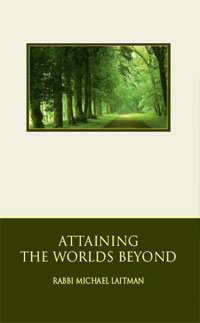A True Human Being Corrects Egoism
There are two levels of human development: animal and human being. (These are not to be confused with the four levels of desires). As we can observe in animal nature, an animal continues to live in the same state as it was born. It does not develop. The qualities that were accorded to an animal on the day of its birth are sufficient for the entire duration of its existence.
The same can be said of a person who rests on this level of development—one who remains the same as during one’s upbringing. All changes that take place in the life of such a person are quantitative in nature.
However, this cannot be said of the “human being” type. In this state, a person is born as an egoist. At some point, this person will discover that egoism rules, and in response, aspires to correct this flaw.
3 Conditions for Revealing the Creator
If a person truly wishes to earn the Revelation of the Creator, then the following must be so:
1. This must be the person’s strongest desire, so that no other desires exist. In addition, this desire must be permanent, for the Creator is eternal and His Will to bestow good is constant. Thus, one who wishes to come closer to the Creator must resemble the Creator in this quality as well, i.e., all desires must be constant. They cannot change depending on circumstances.
2. One must acquire altruistic desires, and devote all thoughts and desires to the Creator. This level is called Hesed or Katnut. Eventually, one will come to earn the Light of Faith, which will bestow the gift of confidence upon the person.
3. One must earn the complete and perfect knowledge of the Creator. The consequences of one’s actions are determined by one’s spiritual level. However, there will be no difference between the spiritual levels if the Light of the Creator shines upon an individual. Since the Creator bestows the vessel and the Light of the soul simultaneously upon the recipient, the person perceives the received knowledge to be perfect.
Working to Serve the Body
Usually, we are in total accord with our bodies; the body dictates its desires to us, and repays us for our labors by letting us experience pleasure. Pleasure, in itself, is spiritual, but in our world it must be connected to some material carrier (e.g., food, sex, music) to enable us to experience it. Even though within ourselves we feel pure pleasure, we are incapable of detaching it completely from its carrier.
Different people enjoy different things and different types of pleasure carriers. But pleasure, in itself, is spiritual, even though we experience it in our brains as an effect of electrical impulses.
Theoretically, it is possible to fully simulate a wide range of pleasures by applying electrical impulses to the brain. Since we are accustomed to receiving various pleasures in the form of their material carriers, this pure pleasure will recreate the images of various carriers in a person’s memory, so that the mind will create music, the taste of food, and so on.
The above makes it clear that we and our bodies service each other. Therefore, when our bodies agree to work, they expect to be rewarded with some form of pleasure.
Escaping from disagreeable sensations can also be considered a kind of pleasure. Any correlation between the work performed and the pleasure received (reward) is a definite indication that the person has performed an egoistic act.
Pleasure from Altruistic Desires
On the other hand, if a person feels that the body is resisting and is asking, “Why work?” it means that the body does not foresee a greater degree of pleasure in the future than it already possesses now. At the least, there is enough increase in pleasure to overcome the propensity to remain in a state of rest. Thus, it does not see any benefit in altering its state.
But if a person decides to abandon the considerations of the body and elects to concentrate on improving the condition of the soul, then the body will refuse to make even the slightest move unless there is the prospect of some personal benefit. The individual will be unable to force the body to work.
Thus, only one solution will be open—to appeal to the Creator for help in moving forward. The Creator does not replace a person’s body, nor alter one’s nature. He doesn’t make miracles to change the fundamental laws of nature.
However, in response to a true prayer, the Creator gives a person a soul—the power to act on the principles of truth.
When we receive egoistic pleasures, it implies that someone else will not be happy while this is occurring.
This is because egoistic pleasures center not only on what we have, but also on what others do not have, since all pleasures are comparative and relative.
Thus, the Creator, Who is always willing to award everyone boundless pleasure, set down one condition—that this pleasure should not be limited by the desires of the body. Pleasure would be received only in the desires that are independent from the desires of the body. These are known as “altruistic” (Ashpa’ah).
 “Fundamental Tips for Revealing the Creator” is based on the book, Attaining the Worlds Beyond by Dr. Michael Laitman.
“Fundamental Tips for Revealing the Creator” is based on the book, Attaining the Worlds Beyond by Dr. Michael Laitman.

